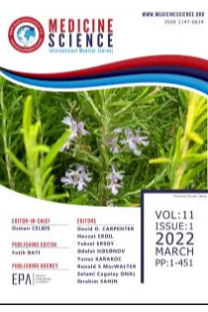Evaluation of knowledge thought and attitudes of Health Services Vocational School students regarding COVID-19 vaccine applications
Evaluation of knowledge thought and attitudes of Health Services Vocational School students regarding COVID-19 vaccine applications
___
- 1. Cobanoglu N. Ethics of Individual, Professional, Social, Scientific and Politic is Questioned By COVID-19 Pandemi. Anatol Clin. 2020;25:36-42.
- 2. World Health Organization. Health Topics. Vaccines and Immunization. https://www.who.int/health-topics/vaccines-and-immunization#tab=tab_1 access date 23.06.2021.
- 3. Xing K, Tu XY, Liu M, et al. Efficacy and safety of COVID-19 vaccines: a systematic review. Chin J Contemp Pediatr. 2021;23:221-28.
- 4. Kazak A, Hintistan S, Onal B. COVID-19 Vaccine Development Studies in the World and Turkey. CBU-SBED. 2020;7:571-75.
- 5. Lipsitch M, Dean NE. Understanding COVID-19 vaccine efficacy. Science. 2020;370:763-65.
- 6. Jeyanathan M, Afkhami S, Smaill F, et al. Immunological considerations for COVID-19 vaccine strategies. Nat. Rev. Immunol. 2020;20:615-32.
- 7. Erkekoglu P, Kose SBE, Balci A, et al. Vaccine Hesitancy and Effects of COVID-19. J Lit Pharm Sci. 2020;9:208-20.
- 8. Akarsu B, Canbay Ozdemir D, Ayhan Baser D, et al. While studies on COVID‐19 vaccine is ongoing, the public’s thoughts and attitudes to the future COVID‐19 vaccine. Int. J. Clin. Pract. 2020 e13891.
- 9. Solís Arce JS, Warren SS, Meriggi NF, et al. COVID-19 vaccine acceptance and hesitancy in low-and middle-income countries. Nat. Med. 202127.
- 10. https://www.osym.gov.tr/TR,19431/2020-yuksekogretim-kurumlari-sinaviyks- yuksekogretim-programlari-ve-kontenjanlari-kilavuzu.html access date 14.08.2021
- 11. Turhan MK. Compulsory Vaccination in Terms of Police Power. Hacettepe HFD, 2019;9:1-40.
- 12. Bozkurt HB. An Overview of Vaccine Rejection and Review of Literature. Kafkas J Med Sci. 2018;8:71–6.
- 13. Gur E. Vaccine hesitancy - vaccine refusal. Turk Arch Pediatr. 2019;54:1-2.
- 14. Atalay S. Neoliberal Policies and Higher Education: A Comparison Between Sociology and Psychology Departments in Turkey. Sosyoloji Dergisi, 2017;35:45-59.
- 15. Dogan MM, Duzel B. Fear-Anxiety Levels in Covid-19. J Turk. Stud. 2020;15.
- 16. Wang K, Wong ELY, Ho KF, et al. Intention of nurses to accept coronavirus disease 2019 vaccination and change of intention to accept seasonal influenza vaccination during the coronavirus disease 2019 pandemic: A cross-sectional survey. Vaccine. 2020;38:7049–56.
- 17. Kwok KO, Li KK, Wei WI, et al. Influenza vaccine uptake, COVID-19 vaccination intention and vaccine hesitancy among nurses: A survey. Int J Nurs Stud. 2020;114:103854.
- 18. Kabamba Nzaji M, Kabamba Ngombe L, Ngoie Mwamba G, et al. Acceptability of Vaccination Against COVID-19 Among Healthcare Workers in the Democratic Republic of the Congo. Pragmat Obs Res. 2020;11:103–9.
- 19. https://covid19asi.saglik.gov.tr/ access date 15.08.2021.
- 20. MacDonald NE. Sage Working Group on Vaccine Hesitancy. Vaccine hesitancy: Definition, scope and determinants. Vaccine. 2015;33:4161–64.
- 21. Lane S, MacDonald NE, Marti M, et al. Vaccine hesitancy around the globe: Analysis of three years of WHO/UNICEF Joint Reporting Form data-2015– 2017. Vaccine. 2018;36:3861–7.
- 22. Wagner AL, Masters NB, Domek GJ, et al. Comparisons of Vaccine Hesitancy across Five Low- and Middle-Income Countries. Vaccine. 2019;7:155.
- 23. Karafillakis E, Larson HJ, Consortium A. The benefit of the doubt or doubts over benefits? A systematic literature review of perceived risks of vaccines in European populations. Vaccine. 2017;35:4840–50.
- 24. Pelcic G, Karacic S, Mikirtichan GL, et al. Religious exception for vaccination or religious excuses for avoiding vaccination. Croat Med J. 2016;57:516–21.
- 25. Yaqub O, Castle-Clarke S, Sevdalis N, et al. Attitudes to vaccination: A critical review. Soc Sci Med. 2014;112:1–11.
- 26. Shekhar R, Sheikh AB, Upadhyay S, et al. COVID-19 vaccine acceptance among health care workers in the United States. Vaccines. 2021;9:119.
- 27. Daly M, Robinson E. Willingness to vaccinate against COVID-19 in the US: longitudinal evidence from a nationally representative sample of adults from April-October 2020. medRxiv. 2020.
- 28. Dodd RH, Cvejic E, Bonner C, et al. Willingness to vaccinate against COVID-19 in Australia. Lancet Infect Dis. 2021;21:318–9.
- 29. Ozisik L, Tanriover MD, Altinel S, et al. Vaccinating healthcare workers: level of implementation, barriers and proposal for evidencebased policies in Turkey. Hum Vacc Immunother. 2017;13:1198–206.
- 30. Latkin CA, Dayton L, Yi G, et al. Mask usage, social distancing, racial, and gender correlates of COVID-19 vaccine intentions among adults in the US. PloS One. 2021;16:e0246970.
- 31. Lazarus JV, Wyka K, Rauh L, et al. Hesitant or not? The association of age, gender, and education with potential acceptance of a COVID-19 vaccine: A country-level analysis. J Health Commun. 2020;25:799-807.
- ISSN: 2147-0634
- Yayın Aralığı: 4
- Başlangıç: 2012
- Yayıncı: Effect Publishing Agency ( EPA )
Evaluation of cardiovascular risk in people with rosacea: A prospective study
Melih AKYOL, Rukiye Yasak GÜNER, Yusuf Cihan DİRİM, Mustafa TOSUN, İsmail TURGUT
Evaluation of the relationship between COVID-19 and hyperglycemia
Seval Müzeyyen ECİN, Deniz GEZER
Sema YİLMAZ, İlknur UZUNOĞLU, Nihal İNANDIKLIOĞLU, Yakup ÇAĞ, Ayşe KARAARSLAN, Ceren ÇETİN, Yasemin AKIN
Leman ACUN DELEN, Zeliha KORKMAZ DİŞLİ
Serkan SÜRÜCÜ, Hüseyin Sina COŞKUN, Lokman KEHRİBAR
Kübra ÖZKÖK KANGAL, Taylan ZAMAN, Cesur ÜSTÜNEL
Effects of different larenageal mask types on hemodynamics and airway in pediatric
Hatice SELÇUK KUŞDERCİ, mesut öterkuş
Metin ERTEM, Emel ÖZVERİ, Deniz Esin TEKCAN ŞANLI, Şafak KIZILTAŞ, Serpil YILMAZ, Ahmet Necati ŞANLI
Neuroprotective effect of nicorandil in 6-OHDA induced in vitro model of parkinson's disease
Clinical results of endoprosthetic reconstructions in metastatic and primary bone tumors
